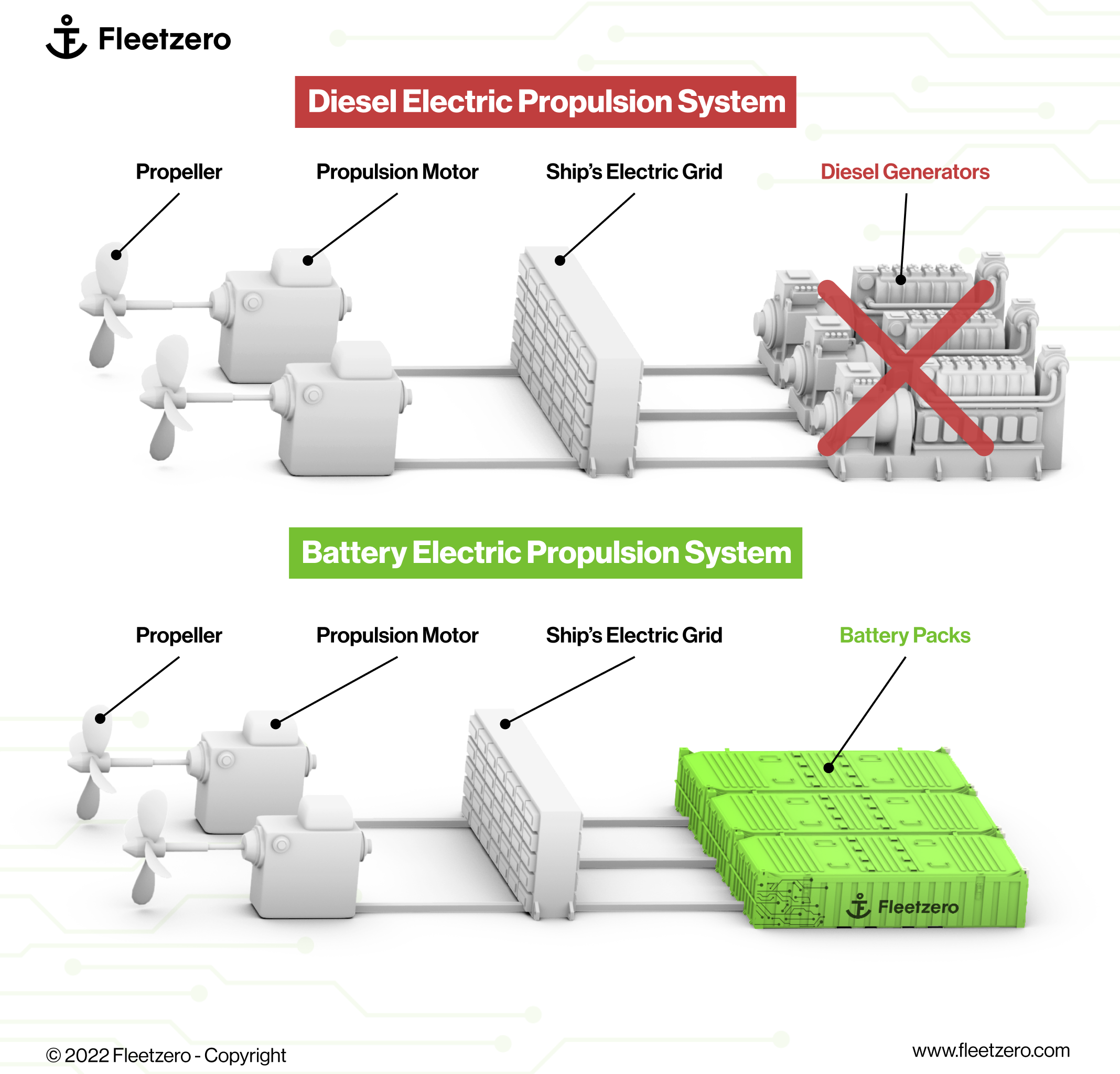
Fleetzero has an bold objective: to compete with international delivery corporations with its personal boats, powered completely by electrical energy. The corporate simply secured $15.5 million in new funding and is trying for the first ship to convert to run on its delivery container-shaped batteries.
The corporate’s plan, described intimately right here, is to convert current ships to electrical propulsion, changing the diesel engine or generator with huge batteries of the firm’s personal design. These could be loaded and unloaded like some other cargo, swapped out at ports and charged between journeys. Accomplished proper (and it appears doubtless that’s the means they’re attempting to do it) a ship doing this could deal with a few of the longest and hottest routes throughout the Pacific.
However although all of it sounds good in concept, clearly in some unspecified time in the future you want to put these theories on the water, and that’s the subsequent step for the firm. Thankfully, co-founders Steven Henderson and Mike Carter have backgrounds in delivery and shipbuilding and are excited to soar in.
Whereas Fleetzero’s tech may ultimately power ships in the 700-foot vary, it is smart to begin with one thing a little bit smaller however that additionally advantages from battery power.
“Corporations throughout the spectrum have reached out to us throughout industries — not simply container delivery,” stated Henderson. “So we’ve been going by means of the record of the largest auxiliary ship corporations, like provide vessels for oil and gasoline corporations, and analysis vessels, and saying: All proper, we’ve acquired this tech, and our objective is ultimately to go do our personal cargo, however we would like to show it out with a companion so we don’t have to spend tens of millions on the first ship.”
Surprisingly, this “need to give us a ship?” pitch went over fairly effectively. “Persons are so keen on our batteries that they’re prepared to pay us to take a look at them,” Henderson added. In the end Fleetzero plans to make their very own boats, however that’s a long-term objective.
It helps to perceive that there’s an actual selection in ocean-going vessels and their operators. Some huge corporations personal and function, some solely personal or solely function, some have fleets for short-term rent and so forth. The potential for electrifying their ships has a unique allure to all these, although some are extra doubtless to chunk first.
A kind of higher prospects is the “auxiliary” class of ships talked about earlier: These are issues like analysis vessels, ships that exit and examine offshore wind farms, and different duties that take a severe boat and crew however aren’t the hyperspecialized bulk movers of container ships. Many of those ships are already partially electrified — they use electrical motors powered by diesel turbines. It feels like the worst of each worlds, however I’m positive they’ve their causes — and extra importantly, they’re very easy to convert to Fleetzero’s battery tech.
“It’s minimal scope; the conversion itself takes a matter of weeks, and it doesn’t contain a dry dock,” stated Henderson. “In the finest case, a PSV [platform supply vessel] about 250 toes lengthy, we put our batteries on the again deck and simply wire them in.”

You actually simply swap out the engine and put the batteries there. Not to scale. Picture Credit: Fleetzero
Such a conversion could be an vital proof of idea; although the firm has loads of inbound, there are certainly doubters on the market who would love to see a working vessel earlier than committing any assets.
Carter famous that Fleetzero is considered one of comparatively few corporations trying to actually transfer the needle in delivery. Although logistics and provide chain economics actually have their share of innovation on the knowledge and companies aspect, the ships and delivery corporations themselves have stagnated.
The truth is, he identified, the White Home lately issued a report lamenting that “three international alliances, made up completely of overseas corporations, management nearly all of ocean freight delivery.” And after they say nearly all, they imply it: We’re speaking 95% of some important commerce strains. The feds will probably be trying into value fixing (and in reality simply handed a legislation), however supporting a sustainable American various is sort of a no brainer as effectively.
It’s laborious to problem such a dominant set of incumbents (which might be termed a cartel at this level), and Fleetzero can’t make any claims to doing in order a contemporary new startup, however their strategy neatly avoids the most direct competitors.
The electrified ships the firm builds with delivery companions will function in parallel to conventional strains, utilizing smaller ports inaccessible to enormous container ships. This protects time (much less ready for a spot at the docks) and cash (cities with disused ports are excited to reactivate them) and makes for a sturdy community of charging and offloading stations throughout the pacific. In fact, they’ll want to make some mates in southeast Asia as effectively.
The brand new funding was led by Breakthrough Vitality Ventures, the Invoice Gates-led enterprise group that the man himself talked about lately at TC Classes: Local weather. Apparently they have been huge on due diligence — it shouldn’t be a shock, however there it’s.
BEV wasn’t alone, although; Founders Fund, McKinley Capital and former traders additionally contributed. Carter stated that McKinley, based mostly in Alaska, was an vital one to get since after all the state makes up an enormous portion of the Pacific U.S. coast.
The cash will probably be essential for constructing out and testing the first ship, however Fleetzero can be hiring — they’d 1,500 candidates for 10 positions after they got here out of stealth. It suggests lots of people in the delivery world are keen on the firm, or maybe lots of people at different corporations are keen on the delivery world.